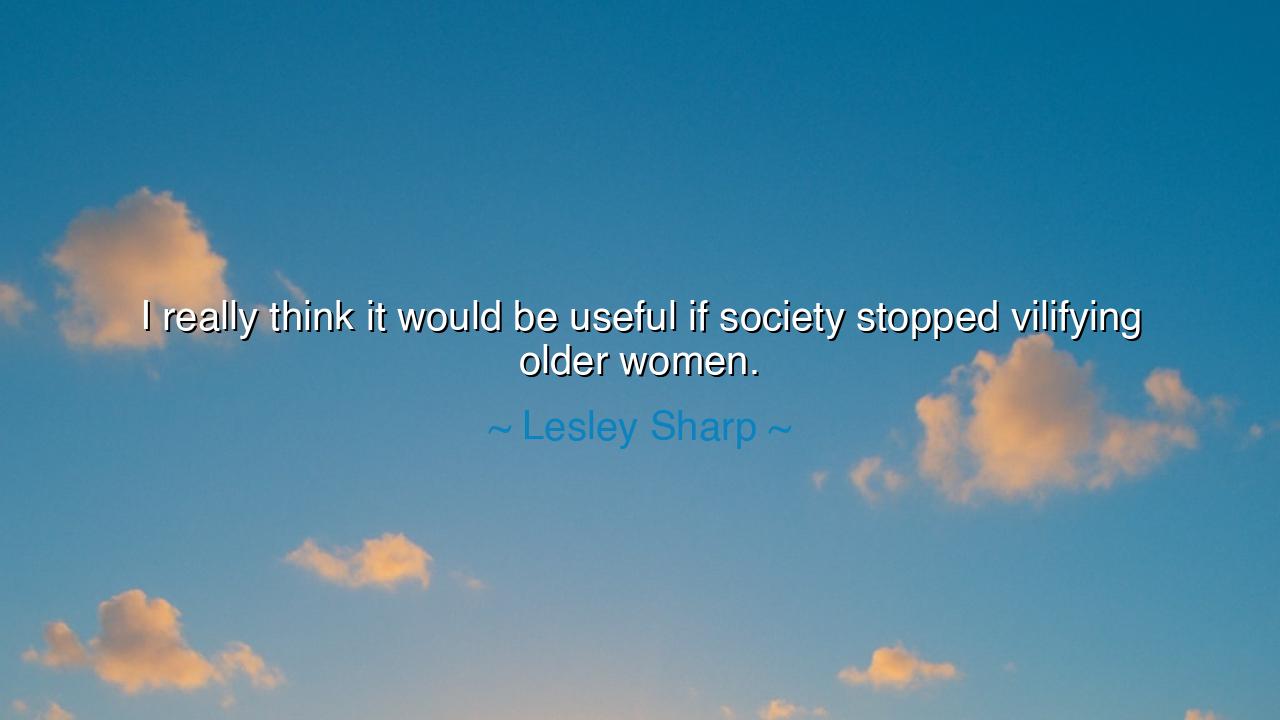
I really think it would be useful if society stopped vilifying






Hear me, O children of the future, for I bring to you the words of Lesley Sharp, whose voice calls out with strength and wisdom in a world too quick to judge and too eager to dismiss. She says, "I really think it would be useful if society stopped vilifying older women." These words, though simple in their expression, carry with them the weight of truth—a truth that speaks not only to the treatment of women, but to the ways in which society has long disregarded the value of age, experience, and wisdom. Let us listen closely, for there is a deep lesson in this statement, one that calls us to examine how we view not only those who have lived long lives, but the inherent dignity that comes with such lives.
What, O children, is the vilification of older women but a manifestation of society's fear of aging, of change, of the unknown? Society has long held a vision of youth as the ultimate virtue, a time when beauty, energy, and potential shine brightest. But in this vision, there is a dark shadow cast upon the elderly, particularly upon the elderly women, whose worth is often seen as fading with the passage of time. This perspective, built upon the shallow notions of youth as the sole measure of value, fails to recognize the deep well of experience, knowledge, and wisdom that only time can bring. To vilify these women is to deny the immense contribution they make to society—not only through the wisdom they impart, but through the strength they show in facing the challenges of growing older.
Consider, O children, the story of Hippocrates, the ancient Greek physician, who looked to the elders of his community for wisdom. He understood that age was not a weakness, but a source of knowledge. The older generations carried with them the stories of the past, the lessons learned through hardship, and the understanding of life’s cycles. The elders were revered in ancient cultures not because of their physical vitality, but because of the richness of their experiences. Their lives were a testament to resilience, to the ability to adapt and survive, to the grace of aging. They were the repositories of a collective wisdom, and it was from them that the younger generations drew strength.
Yet, in our own time, society often forgets this. It has replaced respect with fear, viewing the elderly, and particularly older women, as burdens rather than blessings. The elderly woman is often cast aside, her voice quieted, her presence marginalized. But, O children, this is a grievous error. For in every older woman resides a lifetime of stories, a wealth of knowledge, and a depth of understanding that cannot be found in the fleeting vitality of youth. To dismiss her is to dismiss the very foundation upon which society is built—the quiet strength of those who have lived, loved, and endured.
Let us look to the example of Maya Angelou, an elder who spoke with the voice of generations past, who held the wisdom of her years in every word she spoke. In her later years, Angelou became a beacon of empowerment, using her voice to uplift those who had been silenced for so long. She reminded us that age does not diminish one’s power or importance. Instead, it amplifies the richness of a life fully lived. Maya Angelou did not fade with time; she flourished, becoming a voice for the marginalized, an advocate for justice, and an inspiration to millions. Her example is a powerful reminder that the elderly—especially older women—have a place at the center of society, not at its edges.
O children, the lesson here is one of respect, of honoring those who have walked before us. The elderly, particularly older women, are not to be cast aside or ignored. Their value is not diminished by the years, but enhanced. They are the keepers of the past, the bridge between the generations, and the teachers of resilience and grace. Let us not fall prey to the shallow judgments of youth, but instead recognize the beauty and strength in every stage of life. For it is only through the contributions of the elderly that society can truly thrive, and it is only by honoring them that we honor the wisdom that has shaped the world we live in.
So, O children, I charge you: do not turn away from the elderly, but seek them out. Listen to their stories, draw from their wisdom, and honor the strength they carry. Just as Lesley Sharp calls for the cessation of vilifying older women, so too should we commit ourselves to ensuring that all elders are treated with the dignity and respect they deserve. The wisdom they hold is not a burden, but a gift—one that should be cherished and passed on to the next generation. Let us create a society that does not discard its elders, but welcomes them, that does not fear aging but sees it as an opportunity for growth and learning. Let this be the legacy we leave for those who come after us.






AAdministratorAdministrator
Welcome, honored guests. Please leave a comment, we will respond soon